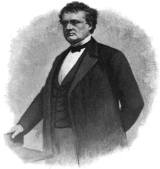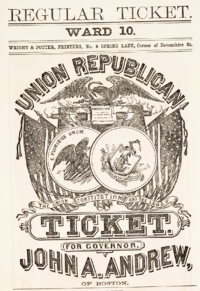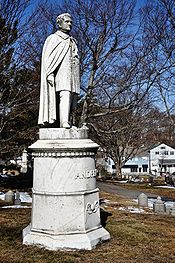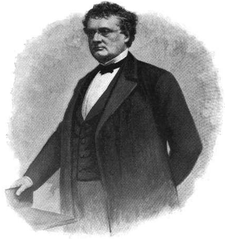
John Albion Andrew
Encyclopedia
John Albion Andrew was a U.S.
political figure. He served as the 25th Governor of Massachusetts
between 1861 and 1866 during the American Civil War
. He was a guiding force behind the creation of some of the first U.S. Army units of black men—including the famed 54th Massachusetts Infantry.
. His father, Jonathan Andrew was a descendant of an early settler of Boxford, Massachusetts and a small but prosperous trader in Windham. His mother, Nancy Green Pierce, was a teacher at Fryeburg Academy. John Albion was the eldest son. His mother died in 1832.
Andrew entered Bowdoin College
in 1833. Although he was studious and popular with other students, he did not shine academically and was ranked near the lowest in his class. After his graduation in 1837, he moved to Boston to study law under Henry H. Fuller, with whom he became close friends.
Andrew married Eliza Jane Hersey of Hingham
on Christmas evening, 1848. They had four children: John Forrester
, born November 26, 1850; Elizabeth Loring, born July 29, 1852; Edith, born April 5, 1854; Henry Hersey, born April 28, 1858.
After his admission to the bar, Andrew joined the Whig party
and began to support the anti-slavery movement. In 1848, he helped organize the Free Soil Party
, which opposed the expansion of slavery. Following the failure of the Free Soil Party, Andrew joined the Republican party in the mid-1850s.
He was elected to as a Representative in the General Court in 1857. Following John Brown's
1859 raid on Harper's Ferry, Virginia, Andrew participated in organizing legal aid for Brown, generating favorable responses amongst the people of Massachusetts. In 1860, he was elected governor of Massachusetts by a huge margin.

 When Andrew took office on January 2, 1861, on the eve of the Civil War, the Albany Argus called him "a lawyer of a low type and a brutal fanatic" who "proposes to maintain the condemned [ personal liberty
When Andrew took office on January 2, 1861, on the eve of the Civil War, the Albany Argus called him "a lawyer of a low type and a brutal fanatic" who "proposes to maintain the condemned [ personal liberty
] statues of [Massachusetts], and to force upon the South by arms, an allegiance to the Constitution thus violated." Andrew immediately began to ready the Massachusetts militia
for duty. He also asked the governors of Maine
and New Hampshire
to prepare for war. Among his early actions were to accept recruits from other states to serve in Massachusetts regiments, including 500 men from California
who he encouraged to join the 2nd Massachusetts Cavalry in 1862 and early 1863.
Andrew's strong feelings about emancipation
are clearly expressed in the following quote from an 1862 speech:
Andrew was receptive to the concept of using black men as uniformed soldiers in the Union army
. In April 1862 he begin working closely with the Federal government and with Frederick Douglass
. He wrote letters to different states and to Lincoln trying to get support. He authorized the formation of two regiments of black infantry, the 54th and 55th Massachusetts, composed of blacks from the state, as well as Ohio
, New York
, Pennsylvania
, and other states. Shortly after the Battle of Antietam
, Andrew became one of the leading state executives at the Loyal War Governors' Conference
in Altoona, Pennsylvania
, which ultimately backed Lincoln's Emancipation Proclamation
and the war effort.
In 1864, Andrew wrote a letter to his close friend and distant cousin President
Abraham Lincoln
describing a woman named Lydia Bixby who lost five sons in battle and asking Lincoln to express his condolences. Lincoln then sent the famous Letter to Mrs. Bixby
to Bixby, who turned out to not only dislike Lincoln, but was also a Confederate
sympathizer.
He left the office of governor in 1866 and again took up the practice of law, although he intended to remain active in politics. Having associated with the Radical Republicans during the war, Andrew took a more conciliatory tone towards Reconstruction, and did not favor some of the Radical Republicans' more extreme measures.
He died in 1867 of apoplexy
after having tea
at his home in Boston. He is buried in the Hingham (Old Ship) Cemetery in Hingham, Massachusetts.
 In 2007, governor Deval Patrick
In 2007, governor Deval Patrick
hung Andrew's portrait over the fireplace in his office, calling him an inspiration.
John A. Andrew St., in the Jamaica Plain
section of Boston, is named in his honor, and his name is one of four on the Soldier's Memorial in the same community.
John Andrew Hospital in Tuskegee, Alabama
is named for him.
 Andrew Square in South Boston and the associated MBTA Red Line subway station Andrew Station.
Andrew Square in South Boston and the associated MBTA Red Line subway station Andrew Station.
United States
The United States of America is a federal constitutional republic comprising fifty states and a federal district...
political figure. He served as the 25th Governor of Massachusetts
Governor of Massachusetts
The Governor of the Commonwealth of Massachusetts is the executive magistrate of the Commonwealth of Massachusetts, United States. The current governor is Democrat Deval Patrick.-Constitutional role:...
between 1861 and 1866 during the American Civil War
American Civil War
The American Civil War was a civil war fought in the United States of America. In response to the election of Abraham Lincoln as President of the United States, 11 southern slave states declared their secession from the United States and formed the Confederate States of America ; the other 25...
. He was a guiding force behind the creation of some of the first U.S. Army units of black men—including the famed 54th Massachusetts Infantry.
Early life and career
John A. Andrew was born in Windham, MaineWindham, Maine
Windham is a town in Cumberland County, Maine, United States. The population was 17,001 at the 2010 census. It includes the villages of South Windham and North Windham...
. His father, Jonathan Andrew was a descendant of an early settler of Boxford, Massachusetts and a small but prosperous trader in Windham. His mother, Nancy Green Pierce, was a teacher at Fryeburg Academy. John Albion was the eldest son. His mother died in 1832.
Andrew entered Bowdoin College
Bowdoin College
Bowdoin College , founded in 1794, is an elite private liberal arts college located in the coastal Maine town of Brunswick, Maine. As of 2011, U.S. News and World Report ranks Bowdoin 6th among liberal arts colleges in the United States. At times, it was ranked as high as 4th in the country. It is...
in 1833. Although he was studious and popular with other students, he did not shine academically and was ranked near the lowest in his class. After his graduation in 1837, he moved to Boston to study law under Henry H. Fuller, with whom he became close friends.
Andrew married Eliza Jane Hersey of Hingham
Hingham, Massachusetts
Hingham is a town in northern Plymouth County on the South Shore of the U.S. state of Massachusetts and suburb in Greater Boston. The United States Census Bureau 2008 estimated population was 22,561...
on Christmas evening, 1848. They had four children: John Forrester
John F. Andrew
John Forrester Andrew was a United States Representative from Massachusetts. He was born to John Albion Andrew and Eliza Jane Andrew in Hingham on November 26, 1850. He attended private schools, including Phillips School and Brooks School. He graduated from Harvard University in 1872 and from...
, born November 26, 1850; Elizabeth Loring, born July 29, 1852; Edith, born April 5, 1854; Henry Hersey, born April 28, 1858.
After his admission to the bar, Andrew joined the Whig party
Whig Party (United States)
The Whig Party was a political party of the United States during the era of Jacksonian democracy. Considered integral to the Second Party System and operating from the early 1830s to the mid-1850s, the party was formed in opposition to the policies of President Andrew Jackson and his Democratic...
and began to support the anti-slavery movement. In 1848, he helped organize the Free Soil Party
Free Soil Party
The Free Soil Party was a short-lived political party in the United States active in the 1848 and 1852 presidential elections, and in some state elections. It was a third party and a single-issue party that largely appealed to and drew its greatest strength from New York State. The party leadership...
, which opposed the expansion of slavery. Following the failure of the Free Soil Party, Andrew joined the Republican party in the mid-1850s.
He was elected to as a Representative in the General Court in 1857. Following John Brown's
John Brown (abolitionist)
John Brown was an American revolutionary abolitionist, who in the 1850s advocated and practiced armed insurrection as a means to abolish slavery in the United States. He led the Pottawatomie Massacre during which five men were killed, in 1856 in Bleeding Kansas, and made his name in the...
1859 raid on Harper's Ferry, Virginia, Andrew participated in organizing legal aid for Brown, generating favorable responses amongst the people of Massachusetts. In 1860, he was elected governor of Massachusetts by a huge margin.
Governor of Massachusetts


Personal liberty laws
.....The personal liberty laws were a series of laws passed by several U.S. states in the North in respone to the Fugitive Slave Acts of 1793 and 1850.-Origins:...
] statues of [Massachusetts], and to force upon the South by arms, an allegiance to the Constitution thus violated." Andrew immediately began to ready the Massachusetts militia
Militia
The term militia is commonly used today to refer to a military force composed of ordinary citizens to provide defense, emergency law enforcement, or paramilitary service, in times of emergency without being paid a regular salary or committed to a fixed term of service. It is a polyseme with...
for duty. He also asked the governors of Maine
Governor of Maine
The governor of Maine is the chief executive of the State of Maine. Before Maine was admitted to the Union in 1820, Maine was part of Massachusetts and the governor of Massachusetts was chief executive....
and New Hampshire
Governor of New Hampshire
The Governor of the State of New Hampshire is the supreme executive magistrate of the U.S. state of New Hampshire.The governor is elected at the biennial state general election in November of even-numbered years. New Hampshire is one of only two states, along with bordering Vermont, to hold...
to prepare for war. Among his early actions were to accept recruits from other states to serve in Massachusetts regiments, including 500 men from California
California
California is a state located on the West Coast of the United States. It is by far the most populous U.S. state, and the third-largest by land area...
who he encouraged to join the 2nd Massachusetts Cavalry in 1862 and early 1863.
Andrew's strong feelings about emancipation
Abolitionism
Abolitionism is a movement to end slavery.In western Europe and the Americas abolitionism was a movement to end the slave trade and set slaves free. At the behest of Dominican priest Bartolomé de las Casas who was shocked at the treatment of natives in the New World, Spain enacted the first...
are clearly expressed in the following quote from an 1862 speech:
Andrew was receptive to the concept of using black men as uniformed soldiers in the Union army
Union Army
The Union Army was the land force that fought for the Union during the American Civil War. It was also known as the Federal Army, the U.S. Army, the Northern Army and the National Army...
. In April 1862 he begin working closely with the Federal government and with Frederick Douglass
Frederick Douglass
Frederick Douglass was an American social reformer, orator, writer and statesman. After escaping from slavery, he became a leader of the abolitionist movement, gaining note for his dazzling oratory and incisive antislavery writing...
. He wrote letters to different states and to Lincoln trying to get support. He authorized the formation of two regiments of black infantry, the 54th and 55th Massachusetts, composed of blacks from the state, as well as Ohio
Ohio
Ohio is a Midwestern state in the United States. The 34th largest state by area in the U.S.,it is the 7th‑most populous with over 11.5 million residents, containing several major American cities and seven metropolitan areas with populations of 500,000 or more.The state's capital is Columbus...
, New York
New York
New York is a state in the Northeastern region of the United States. It is the nation's third most populous state. New York is bordered by New Jersey and Pennsylvania to the south, and by Connecticut, Massachusetts and Vermont to the east...
, Pennsylvania
Pennsylvania
The Commonwealth of Pennsylvania is a U.S. state that is located in the Northeastern and Mid-Atlantic regions of the United States. The state borders Delaware and Maryland to the south, West Virginia to the southwest, Ohio to the west, New York and Ontario, Canada, to the north, and New Jersey to...
, and other states. Shortly after the Battle of Antietam
Battle of Antietam
The Battle of Antietam , fought on September 17, 1862, near Sharpsburg, Maryland, and Antietam Creek, as part of the Maryland Campaign, was the first major battle in the American Civil War to take place on Northern soil. It was the bloodiest single-day battle in American history, with about 23,000...
, Andrew became one of the leading state executives at the Loyal War Governors' Conference
War Governors' Conference
The Loyal War Governors' Conference was an important political event of the American Civil War. It was held at the Logan House Hotel in Altoona, Pennsylvania on September 24 and 25, 1862. Thirteen governors of Union states came together to discuss the war effort, state troop quotas, and the...
in Altoona, Pennsylvania
Altoona, Pennsylvania
-History:A major railroad town, Altoona was founded by the Pennsylvania Railroad in 1849 as the site for a shop complex. Altoona was incorporated as a borough on February 6, 1854, and as a city under legislation approved on April 3, 1867, and February 8, 1868...
, which ultimately backed Lincoln's Emancipation Proclamation
Emancipation Proclamation
The Emancipation Proclamation is an executive order issued by United States President Abraham Lincoln on January 1, 1863, during the American Civil War using his war powers. It proclaimed the freedom of 3.1 million of the nation's 4 million slaves, and immediately freed 50,000 of them, with nearly...
and the war effort.
In 1864, Andrew wrote a letter to his close friend and distant cousin President
President
A president is a leader of an organization, company, trade union, university, or country.Etymologically, a president is one who presides, who sits in leadership...
Abraham Lincoln
Abraham Lincoln
Abraham Lincoln was the 16th President of the United States, serving from March 1861 until his assassination in April 1865. He successfully led his country through a great constitutional, military and moral crisis – the American Civil War – preserving the Union, while ending slavery, and...
describing a woman named Lydia Bixby who lost five sons in battle and asking Lincoln to express his condolences. Lincoln then sent the famous Letter to Mrs. Bixby
Letter to Mrs. Bixby
The Bixby letter is a letter sent from the United States President Abraham Lincoln to a bereaved mother of five sons who were thought to have died while fighting for the Union in the American Civil War. The brief, consoling message was written in November 1864 to Lydia Bixby, a widow living in...
to Bixby, who turned out to not only dislike Lincoln, but was also a Confederate
Confederate States of America
The Confederate States of America was a government set up from 1861 to 1865 by 11 Southern slave states of the United States of America that had declared their secession from the U.S...
sympathizer.
He left the office of governor in 1866 and again took up the practice of law, although he intended to remain active in politics. Having associated with the Radical Republicans during the war, Andrew took a more conciliatory tone towards Reconstruction, and did not favor some of the Radical Republicans' more extreme measures.
He died in 1867 of apoplexy
Apoplexy
Apoplexy is a medical term, which can be used to describe 'bleeding' in a stroke . Without further specification, it is rather outdated in use. Today it is used only for specific conditions, such as pituitary apoplexy and ovarian apoplexy. In common speech, it is used non-medically to mean a state...
after having tea
Tea
Tea is an aromatic beverage prepared by adding cured leaves of the Camellia sinensis plant to hot water. The term also refers to the plant itself. After water, tea is the most widely consumed beverage in the world...
at his home in Boston. He is buried in the Hingham (Old Ship) Cemetery in Hingham, Massachusetts.
Honors and memorials

Deval Patrick
Deval Laurdine Patrick is the 71st and current Governor of Massachusetts. A member of the Democratic Party, Patrick served as an Assistant United States Attorney General under President Bill Clinton...
hung Andrew's portrait over the fireplace in his office, calling him an inspiration.
John A. Andrew St., in the Jamaica Plain
Jamaica Plain, Massachusetts
Jamaica Plain is a historic neighborhood of in Boston, Massachusetts. Founded by Boston Puritans seeking farm land to the south, it was originally part of the city of Roxbury...
section of Boston, is named in his honor, and his name is one of four on the Soldier's Memorial in the same community.
John Andrew Hospital in Tuskegee, Alabama
Tuskegee, Alabama
Tuskegee is a city in Macon County, Alabama, United States. At the 2000 census the population was 11,846 and is designated a Micropolitan Statistical Area. Tuskegee has been an important site in various stages of African American history....
is named for him.

External links
- Jamaica Plain Historical Society
- Library of Congress. Photo of John A. Andrew statue, State House, Boston, Mass.

